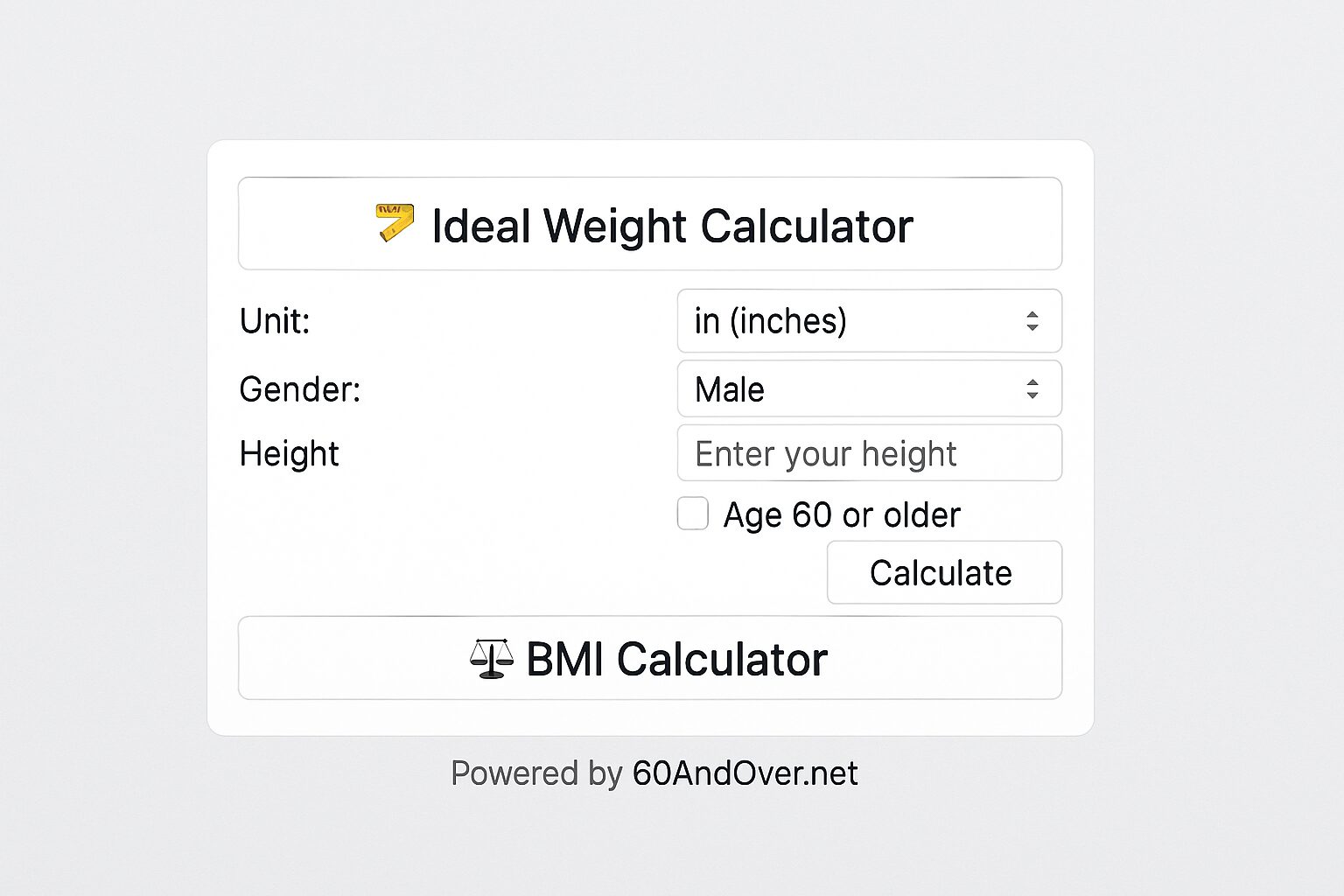Age-Smart Weight Guidance for Senior Women & bMI Calculator Below
As we reach our 60s and beyond, our bodies naturally change. We may lose muscle mass, gain weight more easily, or notice our shape shifting—even if our habits haven’t changed. That’s why BMI for women over 60 should be considered differently than for younger adults.

In this guide, we’ll cover:
✔ What a healthy BMI looks like for senior women
✔ Why geriatric BMI matters
✔ Age-adjusted weight and BMI charts
✔ How to use our free calculator designed for older women
✔ Tips for staying strong and healthy in your 60s, 70s, and beyond
Try the BMI Calculator for Women Over 60
Use the tool below to find your:
- Current BMI (Body Mass Index)
- Ideal weight range based on your age and height
- Personalized tips and next steps
👉What’s a Healthy Weight for Seniors?
Use the calculators below to get your healthy range and tips for staying well as you age. And remember, you’re more than just a number!
Weight & BMI Tools for 60 and Over
Senior-friendly calculators. These tools are informational and not medical advice. Always consult your healthcare provider for personalized guidance.
Gentle Walking Shoes for Seniors
Supportive, non-slip footwear can make daily movement safer and more comfortable.
Low-Impact Resistance Bands
Great for at-home strength training and mobility exercises—beginner friendly.
Senior Multivitamin
A popular 50+ multivitamin—review ingredients with your doctor before use.
Healthy Knee Pain Help (Guide)
Senior-friendly tips for gentle movement, mobility, and meal planning. Educational—consult your healthcare provider.
Affiliate disclosure: We may earn a commission from qualifying purchases. This does not affect the price you pay.
Many readers choose supportive walking shoes and gentle chair exercise programs to stay active safely.
- EFFORTLESS SLIP-ON DESIGN: These slip on shoes for women feature a convenient hands-free…
- SUPERIOR COMFORT TECHNOLOGY: Ultra Go cushioning and Air-Cooled Memory Foam insole provide…
- SECURE FIT: Heel Pillow technology and bungee closure system ensure these slip on sneakers…
- VERSATILE PERFORMANCE: Super flexible traction outsole makes these womens slip on shoes…
- SUPERIOR COMFORT AND FIT: These slip on shoes for men feature Air-Cooled Goga Mat insole…
- FLEXIBLE PERFORMANCE: Multi-surface stabilized Flex Pillars outsole provides reliable…
- BREATHABLE DESIGN: Heathered mesh upper with fixed stretch bungee laces ensures…
- LIGHTWEIGHT CONSTRUCTION: Ultra-lightweight Soft Stride cushioning foam delivers all-day…
- Full-Body Chair Workouts for Seniors: Stay active at any age with chair exercises for…
- Easy-to-Follow Exercise Guide + Online Videos: Get a large-print chair exercise chart plus…
- Includes Resistance Bands and Easy-Grip Handles – Set includes 2 resistance bands and…
- Improve Strength, Balance & Mobility at Home- These gentle senior chair exercises help…
What Is a Healthy BMI for Women Over 60?
For senior women, the traditional BMI ranges (18.5–24.9) aren’t always the most appropriate. In fact, new research supports using a geriatric BMI range that accounts for age-related muscle loss and body composition changes.
🧠 Geriatric BMI Range:
| Age Group | Recommended BMI |
|---|---|
| Adults under 60 | 18.5 – 24.9 |
| Women 60+ | 23 – 27 |
🔍 A BMI between 25 and 27—often considered “overweight”—may actually be healthiest for older women, especially those who are active and mobile.
Why BMI Changes After 60
BMI is a helpful tool—but it has limits, especially for older adults. It’s based on height and weight alone and doesn’t measure:
- Muscle mass
- Bone density
- Fat distribution
For women over 60, these factors change naturally due to aging and menopause. You may lose muscle, gain fat in different areas, or shrink slightly in height—all of which affect BMI without necessarily reflecting your health status.
📊 BMI Chart for Women Over 60 (by Height)
Use this chart to find your healthy weight range based on your height, tailored for women aged 60 and over:
| Height (Feet & Inches) | Healthy Weight Range (lbs) |
|---|---|
| 4’10” | 95 – 121 |
| 5’0″ | 101 – 128 |
| 5’2″ | 108 – 137 |
| 5’4″ | 114 – 145 |
| 5’6″ | 120 – 154 |
| 5’8″ | 126 – 163 |
| 5’10” | 132 – 172 |
| 6’0″ | 138 – 181 |
📝 These numbers are based on a BMI between 23 and 27, reflecting the ideal range for most healthy senior women.
Why Weight Still Matters After 60
Even though BMI isn’t everything, maintaining a healthy weight for your age and body type helps protect against:
- 🦴 Osteoporosis and fall risk
- ❤️ Heart disease and high blood pressure
- 🧠 Cognitive decline
- 🩺 Diabetes and inflammation
- 💪 Muscle weakness or frailty
Rather than chasing a number, focus on staying strong, mobile, and independent.
✅ Tips to Maintain a Healthy BMI After 60
- 🥗 Prioritize protein: Helps maintain muscle as metabolism slows
- 🚶♀️ Stay active: Walking, light strength training, stretching all matter
- 💤 Sleep well: Poor sleep increases weight gain and cravings
- 💧 Drink water: Hydration supports metabolism and energy
- 📆 Track trends, not pounds: Weigh monthly or quarterly—not daily
🧠 FAQ: BMI for Senior Women
Q: What is the ideal BMI for a 60-year-old woman?
A: Generally, a BMI between 23 and 27 is considered healthy for women over 60, especially if you’re physically active and have good muscle tone.
Q: Should I worry if my BMI is over 25?
A: Not necessarily. In older adults, a BMI between 25 and 27 may be ideal, and even a BMI up to 29 isn’t uncommon in healthy, active seniors.
Q: What if I’m underweight after 60?
A: A BMI under 22 could increase your risk for falls, fractures, and weakened immunity. Talk to your doctor if you’ve lost weight unintentionally.
Q: How often should I check my BMI?
A: For most people, checking every few months is enough. Use BMI as a guide—not a goal.
Q: What’s more important than BMI?
A: Strength, energy, flexibility, and ability to do the things you love matter more than hitting a number on a chart.
Final Thoughts
Your health after 60 is about so much more than your weight. But using a BMI calculator for women over 60, paired with realistic, age-appropriate guidance, can help you feel confident and informed about your body.
👉 Use the tool above to find your healthy range—and check out our guides on senior exercise, healthy eating for women 60+, and how to gain strength safely after menopause.
Easy-to-Read Ideal Weight Chart for Seniors
Based on the evidence-based formula (with 5% reduction for seniors):
| Height | Men (60+) | Women (60+) |
|---|---|---|
| 5’0” (60”) | 47.5 kg (104.7 lbs) | 43.2 kg (95.2 lbs) |
| 5’2” (62”) | 52.1 kg (114.9 lbs) | 47.8 kg (105.4 lbs) |
| 5’4” (64”) | 56.7 kg (125.0 lbs) | 52.4 kg (115.5 lbs) |
| 5’6” (66”) | 61.3 kg (135.1 lbs) | 57.0 kg (125.7 lbs) |
| 5’8” (68”) | 65.9 kg (145.3 lbs) | 61.6 kg (135.9 lbs) |
| 5’10” (70”) | 70.5 kg (155.4 lbs) | 66.2 kg (146.0 lbs) |
| 6’0” (72”) | 75.1 kg (165.6 lbs) | 70.8 kg (156.2 lbs) |
How to Use This Chart
- Find the height in the left column.
- Read across for ideal weight (already adjusted for age 60+).
- These are guidelines for healthy seniors, not strict limits.
- If someone is very athletic or has special health needs, these may differ.



